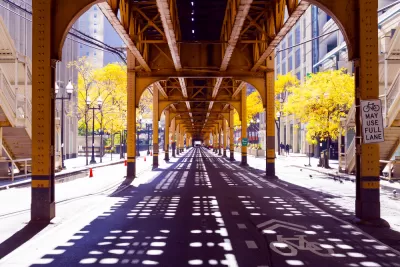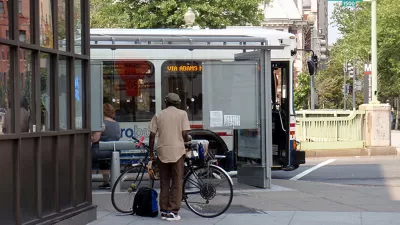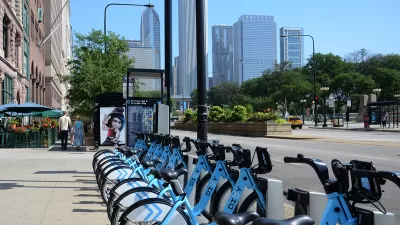A year after a report showed a giant discrepancy in enforcement of bike regulation between white and black riders, data the Chicago Police Department continues to target black bikers.

A year ago, Mary Wisniewski, reporting in the Chicago Tribune, exposed big inequities in how black and white cyclists are treated. "She found that in 2017 roughly 56 percent of the bike citations were written in majority-African-American neighborhoods, with only about 24 percent written in Latino communities, and a mere 18 percent issued in majority-white neighborhoods," John Greenfield writes for Streetsblog.
A year later the numbers show the CPD hasn't done anything to curb this inequity. "Oboi Reed, the former head of the bike equity group, Slow Roll Chicago, who currently leads the mobility justice organization Equiticity, is briefly quoted in the Tribune piece, stating that he believes the bike ticketing provides an excuse for stop-and-frisk policing." Reed sees the ticketing practice persisting, because that's how some in the CPD want it to be. "Solving the problem of unfair bike ticketing practices seems like a relatively simple matter – commanders should be able to order their officers to ease up on ticketing in parts of town that are currently getting a disproportionate number of tickets," Greenfield writes.
The city continues to face complaints about bias in its policing, facing protests after the shooting of Laquan McDonald and against a $95 million dollar Police Training Center. With threatened school closures and other looming financial issues, city services are coming under increasing scrutiny, particularly those related to the police. Unequal enforcement means unequal justice. In an environment where the Chicago Police Department has limited resources, the unequal enforcement of bike regulations makes poor use of them.
FULL STORY: Equiticity’s Oboi Reed Responds to the Latest Tribune Report on Racially Biased Bike Ticketing

Alabama: Trump Terminates Settlements for Black Communities Harmed By Raw Sewage
Trump deemed the landmark civil rights agreement “illegal DEI and environmental justice policy.”

Planetizen Federal Action Tracker
A weekly monitor of how Trump’s orders and actions are impacting planners and planning in America.

The 120 Year Old Tiny Home Villages That Sheltered San Francisco’s Earthquake Refugees
More than a century ago, San Francisco mobilized to house thousands of residents displaced by the 1906 earthquake. Could their strategy offer a model for the present?

Indy Neighborhood Group Builds Temporary Multi-Use Path
Community members, aided in part by funding from the city, repurposed a vehicle lane to create a protected bike and pedestrian path for the summer season.

Congestion Pricing Drops Holland Tunnel Delays by 65 Percent
New York City’s contentious tolling program has yielded improved traffic and roughly $100 million in revenue for the MTA.

In Both Crashes and Crime, Public Transportation is Far Safer than Driving
Contrary to popular assumptions, public transportation has far lower crash and crime rates than automobile travel. For safer communities, improve and encourage transit travel.
Urban Design for Planners 1: Software Tools
This six-course series explores essential urban design concepts using open source software and equips planners with the tools they need to participate fully in the urban design process.
Planning for Universal Design
Learn the tools for implementing Universal Design in planning regulations.
Clanton & Associates, Inc.
Jessamine County Fiscal Court
Institute for Housing and Urban Development Studies (IHS)
City of Grandview
Harvard GSD Executive Education
Toledo-Lucas County Plan Commissions
Salt Lake City
NYU Wagner Graduate School of Public Service




























